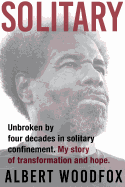
Activist Albert Woodfox does not profess to be a saint in his memoir Solitary. He's painfully honest with his audience, detailing the path that led him to a 50-year prison sentence in Angola in the 1970s. Woodfox also unlocks the bars and ushers his readers into conditions most would consider beyond their darkest nightmares: "Coming out of slavery and convict leasing, it was as if the cruelty of Angola's history leaked into our present world. Angola was run like an antebellum slave plantation."
Despite the barbaric environment, Woodfox finds hope and purpose in the principles of the Black Panther Party. He explains, "I didn't just get it with my mind, I felt it with my heart, my soul, my body. It was as if a light went on in a room inside me that I hadn't know existed." His involvement with the group turns into a mixed blessing, though. He and another member are framed for a guard's murder and receive life sentences in solitary. Kept in a 6'x9' cell for 23 hours a day, it's the Panther code of living that helps Woodfox ultimately maintain his humanity until he's exonerated nearly 45 years later.
In beautifully poetic language that starkly contrasts the world he's describing, Woodfox awes and inspires. He illustrates the power of the human spirit, while illuminating the dire need for prison reform in the United States. Solitary is a brilliant blend of passion, terror and hope that everyone needs to experience. --Jen Forbus

